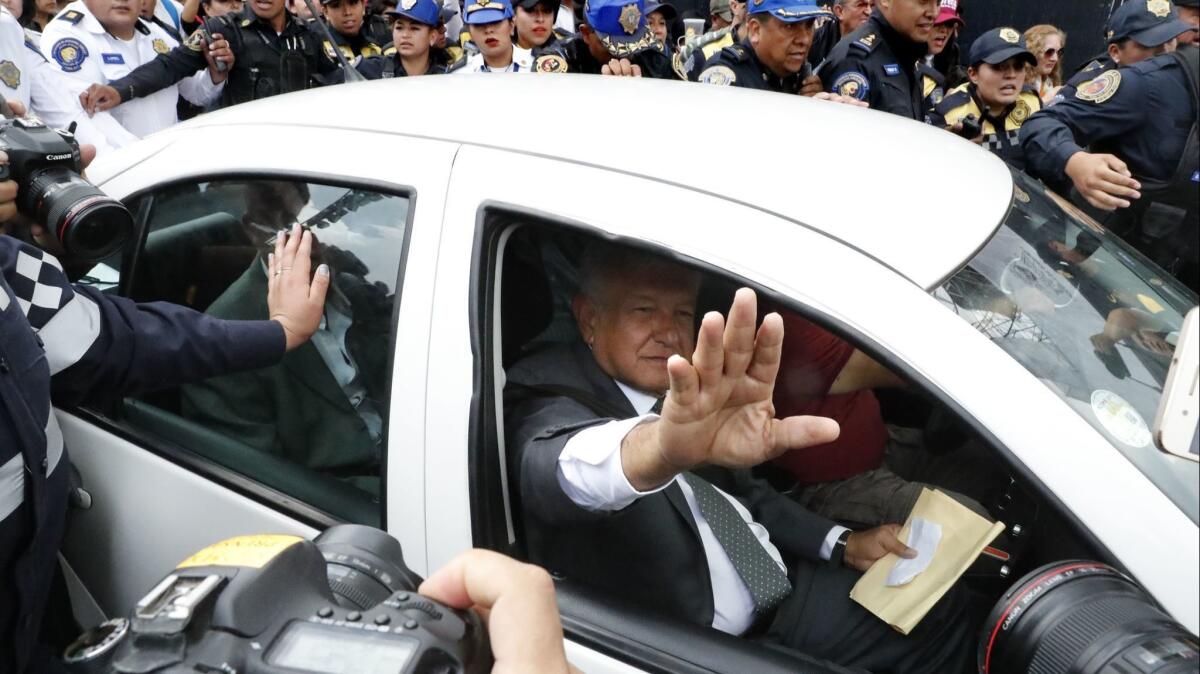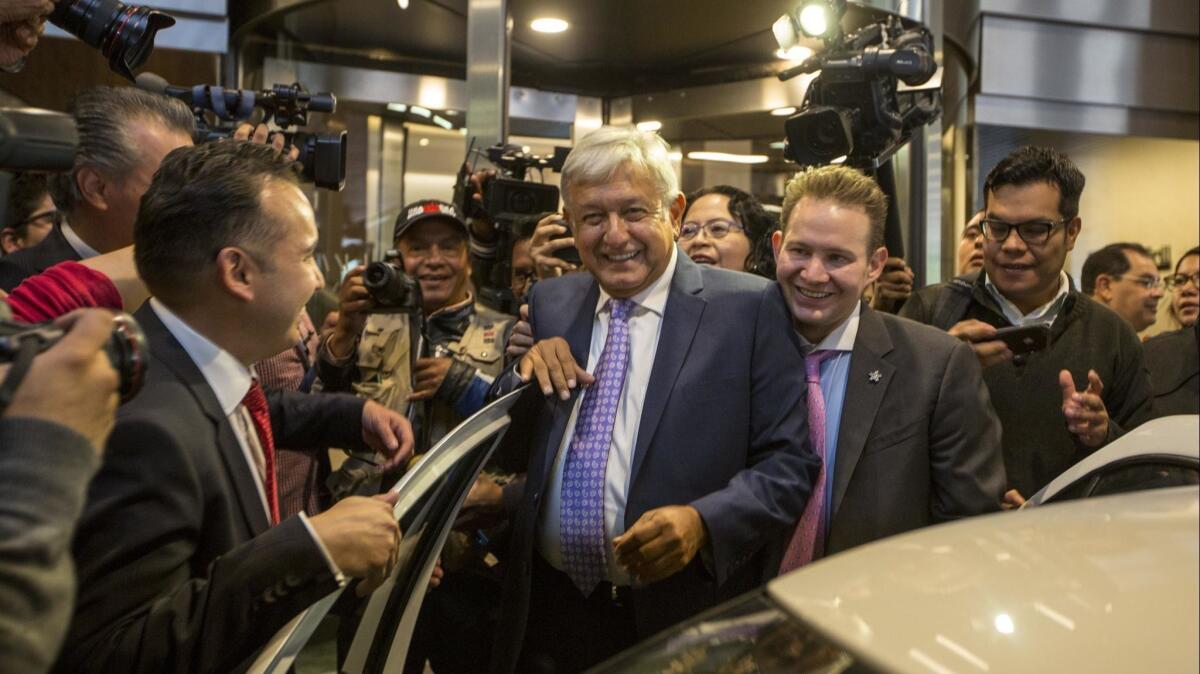Once denounced as a political threat, Lopez Obrador is now the darling of Mexico

Reporting from Mexico City — In little more than a week he has gone from being denounced as a looming threat to stability, a Mexican incarnation of the late Venezuelan leftist firebrand Hugo Chavez, to being the darling of Mexico.
Newly elected president Andres Manuel Lopez Obrador is relishing a singular, exuberant honeymoon — though he doesn’t take office until Dec. 1.
Since election day, a public love-fest has enveloped the man known variously as AMLO, for his initials, or El Peje, after a freshwater fish native to the southern state of Tabasco, the new president’s subtropical home turf.
His rivals have embraced him, current President Enrique Peña Nieto has hosted him in the ornate National Palace, business leaders have extolled his message of moderation and well-wishers have celebrated his relaxed style.
On social media, hashtags such as #AMLOVE have been trending, reflecting a kind of collective euphoria normally not associated with Mexican politicians.
A signature postelection image seen almost daily on TV here has been footage of ecstatic supporters seeking selfies with Mexico’s next president— as the silver-haired, 64-year-old political veteran flashes a broad smile, often from the front passenger seat of the ubiquitous white Volkswagen sedan that ferries him about town.

In just days, Lopez Obrador has softened the image of Mexican presidents as aloof, distant leaders who relish an imperious formality.
“Lopez Obrador, Superstar,” was the headline of a column Sunday in Mexico’s Milenio newspaper, a mainstream publication not previously known for its affection for Mexico’s president-in-waiting.
“The war didn’t break out,” wrote Milenio columnist Alvaro Cueva, referring to the aftermath of the July 1 national elections. “The peso didn’t crash and we didn’t become Venezuela. In contrast, Andres Manuel Lopez Obrador won the elections last Sunday and one of the most peculiar periods in the history of our country began, a period of peace, of harmony, of hope.”
It has been an extraordinary turnaround for a twice-defeated presidential contender who had been long derided as a sore loser, a scold and a radical whose vow to “transform” Mexico was assailed as warmed-over, left-wing populism.
Even U.S. President Trump — who couldn’t be more distinct from Lopez Obrador in style and ideology — has exchanged warm words with Mexico’s incoming president. Lopez Obrador said he planned to extend an inaugural invitation to Trump, whose disparagement of Mexico and Mexicans has earned widespread animosity here.
To some extent, Mexico’s new president has even echoed Trump’s views on Mexican illegal immigration, promising that he would try to improve job opportunities at home so his compatriots wouldn’t have to emigrate. He has also vowed to work for a renewed North American Free Trade Agreement, the trade accord between the United States, Mexico and Canada currently being renegotiated.
“Mexicans are going to be able to work and feel happy where they were born, where their families are, their customs, their cultures,” vowed Lopez Obrador, who served as Mexico City’s mayor from 2000 to 2005.
The new president’s self-declared “I’m not going to change till I die” mantra has played out in stark contrast to the scripted style of Peña Nieto. His impromptu declarations and casual approach have provided a startling contrast to the well-manicured president’s reliance on choreographed appearances.
Mexico appears to be shifting from a president worried that he may say the wrong thing to a leader who, like Trump, relishes extemporaneous pronouncements.
In his comments, Lopez Obrador has not backed down from his grandiose pledges for a “radical” shift and sweeping “transformation” of Mexican society, but he seems to have abandoned the self-righteous, evangelical style evident for years on a seemingly endless campaign trail.
Notably absent last week were the shrill denunciations of the “mafia of power,” the elite political circle that Lopez Obrador has accused of running the country for its own selfish interests.
“I will not let you down,” he promised in his victory speech at the Zocalo, the central plaza of Mexico City.
“What do I say to the people?” Lopez Obrador asked last week as yet another swarm of reporters mobbed him at his party headquarters. “We love each other! It’s reciprocal love.”
He has eschewed security details, vowed to travel on commercial airlines instead of government planes, promised not to live in the sumptuous presidential residence and said he would take only half the salary of his predecessor. The austerity pledge has resonated.
In his administration, Lopez Obrador said, “there will be hugs, not bullets.”
A controversial proposal to provide amnesty to criminals will be applied only to youths, women and others coerced into organized crime — not to hardened offenders convicted of violent crimes, members of his transition team vowed last week.
Fears of a collapse of the Mexican peso have so far proved fleeting, as the national currency experienced one of its sharpest upsurges in years following Lopez Obrador’s election, thanks in part to a downturn in the value of the U.S. dollar. Mexico’s wealthy class and international markets have breathed a collective sigh of relief as Lopez Obrador has vowed not to interfere in fiscal matters and to respect private property, investments and “the rule of law.”
On Sunday, the national election institute confirmed Obrador’s more than 30-point victory, the largest winning margin for a presidential contender since the heyday of Mexico’s long-dominant Institutional Revolutionary Party, or PRI, from which Lopez Obrador and other left-leaning figures split in the late 1980s. Lopez Obrador prevailed in Mexico City and in all but one of Mexico’s 31 states, and his political party and allies were on course for a majority in both houses of Mexico’s Congress.
Of course, it will not be all smooth sailing once Lopez Obrador assumes the presidency for his six-year term. Whether Mexico’s sluggish economy will improve or sink further remains uncertain, especially as questions linger about the free-trade regimen with the United States, destination of almost 80% of Mexico’s exports.
Many are skeptical of his plans to fund a sweeping agenda — including new pensions for the elderly and disabled, scholarships for students, plus revived healthcare and education systems — from savings generated via crackdowns on corruption and government waste. Some of his own high-profile political allies have in the past been linked to corruption and electoral fraud.
Others wondered whether it’s prudent for a modern-day president in a violence-plagued nation to go without a professional security detail. Lopez Obrador’s sedan is typically trailed by one or two police motorcycles and a phalanx of news crews on motorbikes.
But, for the time being, dubious forecasts about the future Lopez Obrador administration are muted as the incoming president continues his charm offensive on the streets of the capital.
“There will be no divorce … this will be a government for the people and with the people,” Lopez Obrador said. “I am very conscious about my historic responsibility. I don’t want to go down in history as a bad president.”
Cecilia Sanchez of The Times’ Mexico City bureau contributed to this report.
Twitter: @PmcdonnellLAT
More to Read
Sign up for Essential California
The most important California stories and recommendations in your inbox every morning.
You may occasionally receive promotional content from the Los Angeles Times.










